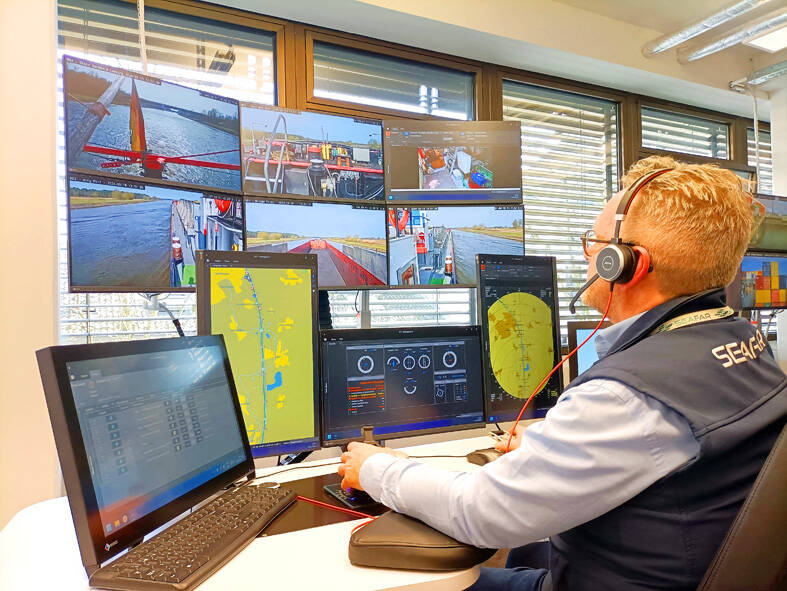With the flow of new recruits into the seafaring sector drying up, a German company is exploring a potentially revolutionary measure — sending ships off without a captain on board.
HGK Shipping GmbH, based in Germany’s Port of Duisburg, is testing remote navigation from a control center on land.
Driverless vessels are “the only solution to survive as an industry,” HGK CEO Steffen Bauer said.

Photo: AFP
The average captain’s age on HGK’s 350 vessels is about 55, said Bauer, whose company claims to be the leading river cargo operator in Europe.
“If we do nothing, we’ll lose 30 percent of our sailors by 2030,” he said.
In search of a solution, HGK has signed a partnership agreement with the Belgian start-up Seafar NV, a leader in the emerging field of autonomous navigation.
Founded in 2019, Seafar already operates four pilotless vessels in Belgium and has just opened an office in Germany, which represents 30 percent of Europe’s inland shipping.
The crewless ships are guided from a control center, turning navigation from grueling work into a potentially more attractive office job.
“There is a market for remote-controlled ships,” Seafar commercial director Janis Bargsten said, adding that establishing a regulatory framework would take less time than perfecting the technology.
In Duisburg, Seafar and HGK have already created a center for autonomous navigation and are awaiting the approval of the German authorities to launch their first vessels. In the initial test phase, two captains would remain on board the remotely guided ships.
The longer-term aim is to eliminate the captain’s role completely while still keeping some crew on board, Bauer said.
The technology is similar to those used in self-driving vehicles: The ships are fitted with sensors, cameras, radar, and light detection and ranging imaging, transmitting data in real time to the command center.
“Everything is as it would be on board a ship,” navigator Patrick Hertoge said in Duisburg next to 10 monitors displaying the status of an autonomous barge on its way to Hamburg.
After 30 years skippering his own barge, 58-year-old Hertoge was recruited by Seafar to work on the autonomous shipping project.
The son of two sailors, he sold his vessel and found a home on dry land for the first time in his life, he said.
“On a boat, you are on standby 24 hours a day, but here, after eight hours, I can go home,” he said.
Seafar wants to start more pilot schemes in Europe and is in “advanced” talks with the French inland waterways authority.
It is also planning a test project in the Baltic Sea, Bargsten said.
Autonomous navigation could bring “significant relief” to an industry under pressure, but would not solve “all problems a Federal Association of German Inland Navigation spokesman said.
“New questions of responsibility” require legal clarification, he said.
In the event of a technical problem, Seafar would be liable, but a human error would be chalked up to the shipping company, Bargsten said.
Remotely navigating a vessel is still a highly demanding job that could not just be left to “gamers,” he added.
With years of real-life captaining under his belt, Hertoge is convinced it can be successful.
Much of the work of captaining a ship is the same on land as it is in a control room, he said.
The only thing missing is the wind.

The US dollar was trading at NT$29.7 at 10am today on the Taipei Foreign Exchange, as the New Taiwan dollar gained NT$1.364 from the previous close last week. The NT dollar continued to rise today, after surging 3.07 percent on Friday. After opening at NT$30.91, the NT dollar gained more than NT$1 in just 15 minutes, briefly passing the NT$30 mark. Before the US Department of the Treasury's semi-annual currency report came out, expectations that the NT dollar would keep rising were already building. The NT dollar on Friday closed at NT$31.064, up by NT$0.953 — a 3.07 percent single-day gain. Today,

‘SHORT TERM’: The local currency would likely remain strong in the near term, driven by anticipated US trade pressure, capital inflows and expectations of a US Fed rate cut The US dollar is expected to fall below NT$30 in the near term, as traders anticipate increased pressure from Washington for Taiwan to allow the New Taiwan dollar to appreciate, Cathay United Bank (國泰世華銀行) chief economist Lin Chi-chao (林啟超) said. Following a sharp drop in the greenback against the NT dollar on Friday, Lin told the Central News Agency that the local currency is likely to remain strong in the short term, driven in part by market psychology surrounding anticipated US policy pressure. On Friday, the US dollar fell NT$0.953, or 3.07 percent, closing at NT$31.064 — its lowest level since Jan.

The New Taiwan dollar and Taiwanese stocks surged on signs that trade tensions between the world’s top two economies might start easing and as US tech earnings boosted the outlook of the nation’s semiconductor exports. The NT dollar strengthened as much as 3.8 percent versus the US dollar to 30.815, the biggest intraday gain since January 2011, closing at NT$31.064. The benchmark TAIEX jumped 2.73 percent to outperform the region’s equity gauges. Outlook for global trade improved after China said it is assessing possible trade talks with the US, providing a boost for the nation’s currency and shares. As the NT dollar

The Financial Supervisory Commission (FSC) yesterday met with some of the nation’s largest insurance companies as a skyrocketing New Taiwan dollar piles pressure on their hundreds of billions of dollars in US bond investments. The commission has asked some life insurance firms, among the biggest Asian holders of US debt, to discuss how the rapidly strengthening NT dollar has impacted their operations, people familiar with the matter said. The meeting took place as the NT dollar jumped as much as 5 percent yesterday, its biggest intraday gain in more than three decades. The local currency surged as exporters rushed to